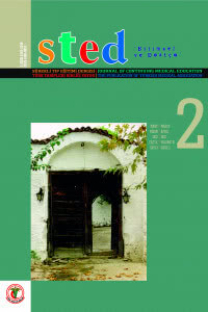Ağır Demir Eksikliği Anemisi ve İnvaginasyon ile Gelen Bir Meckel Divertikülü Olgusu
A Case of Meckel Diverticulum Presenting with Profound Iron Deficiency Anemia and Invagination
___
- 1. Wyllie R. Intestinal duplications, Meckel Diverticulum, and other remnants of the omphalomesenteric duct. In: Behrman RE, Kliegman RM, Jenson HB (eds). Nelson Texbook of Pediatrics (17th ed). Philadelphia: WB Saunders, 2004: 1236-7.
- 2. Schwartz MW (Çeviri editörleri: Süoğlu ÖD, Kara B). Pediatride Pratik Yaklaşımlar. İstanbul: Nobel Tıp Kitabevleri, 2000:502-3.
- 3. Al-Onaizi I, Al-Awadi F, Al-Dawood AL. Iron deficiency anemia: an unusual complication of Meckel diverticulum. Med Princ Pract 2002; 11(4): 214-7.
- 4. Esposito C, Giurin I, Savanelli A, Iaquinto M, Ascione G, Settimi A. Meckels diverticulum causing severe hemorrhage. Eur J Pediatr 2012;733-4.
- 5. Al-Onaizi I, Al-Awadi F, Al-Dawood AL. Iron deficiency anaemia: an unusual complication of Meckel's diverticulum. Med Princ Pract. 2002 OctDec;11(4):214-7.
- 6. Karagüzel G. Bağırsak tıkanıklıkları. İçinde: Karaböcüoğlu M, Yılmaz HL, Duman M (yazarlar). Çocuk Acil Tıp (1. basım). İstanbul, İstanbul Tıp Kitapevi. 2012: 1869-74.
- 7. J.H. Shelton, T.W. Newsome, K.L. Ford III, J.K. Hamilton. Inverted Meckels diverticulum presenting as iron deficiency anemia. Endoscopy 2006; 38:E93-E94.
- 8. Kırıştıoğlu İ. İnvajinasyonlarda tedavi Yaklaşımları. Güncel Pediatri 2004;2:131-3.
- 9. Young DG. Intussusception. In: ONeil JA, Rowe MI, Grosfeld JL, Fonkalstrud EW, Coran AG (eds), Pediatric Surgery (5th ed) Vol. 2, St Louis: Mosby 1998: 1185-98.
- 10. Rho JH, Kim JS, Kim SY, Kim SK, Choi YM, Kim SM, Tchah H et al. Clinical features of symptomatic Meckels Diverticulum in children: Comparison of scintigraphic and non-scintigraphic diagnosis. Pediatr Gastroenterol Hepatol Nutr. 2013;16(1):41-8.
- 11. Tseng YY, Yang YJ. Clinical and disgnostic relevance of Meckels Diverticulum in children. Eur J Pediatr.2009;168(12):1519-23
- 12. Lanzkowsky P. Manuel of Pediatric Hematology and Oncology (5th ed). San Diego: Academic Press 2011:1-13.
- 13. Ertekin V, Tosun MS, Küçük N. The prevalence of celiac disease in children with iron-deficiency anemia. Turk J Gastroenterol. 2013;24(4):334-8.
- ISSN: 1300-0853
- Yayın Aralığı: 6
- Başlangıç: 1992
- Yayıncı: -
Bir Toplum Sağlığı Sorunu Olarak İntihar
Hamza ÇOBAN, Neslihan DEMİREL, Can YENER, M. Muhsin YILMAZ, Seda YOLGİDEN, Can KESKİN, DİLEK ASLAN
Ağır Demir Eksikliği Anemisi ve İnvaginasyon ile Gelen Bir Meckel Divertikülü Olgusu
Ülkü TIRAŞ, YUSUF ZİYA ARAL, Rukiye Ünsal SAÇ, M. Ayşin TAŞAR, Mine TINMAZ, F. İnci ARIKAN, Yıldız Bilge DALLAR
Van Gölü Çevresi Atık Su Arıtma Tesislerinin Mevcut Durumlarının Değerlendirilmesi
Emine BOTAN ULU, Sinemis DAĞLI ÇETİN, Ayşe YÜKSEL
FUNDA EVCİLİ, ZELİHA BURCU YURTSAL, Gülçin ABAK, Berrin TALİ, Sultan TEMEL
